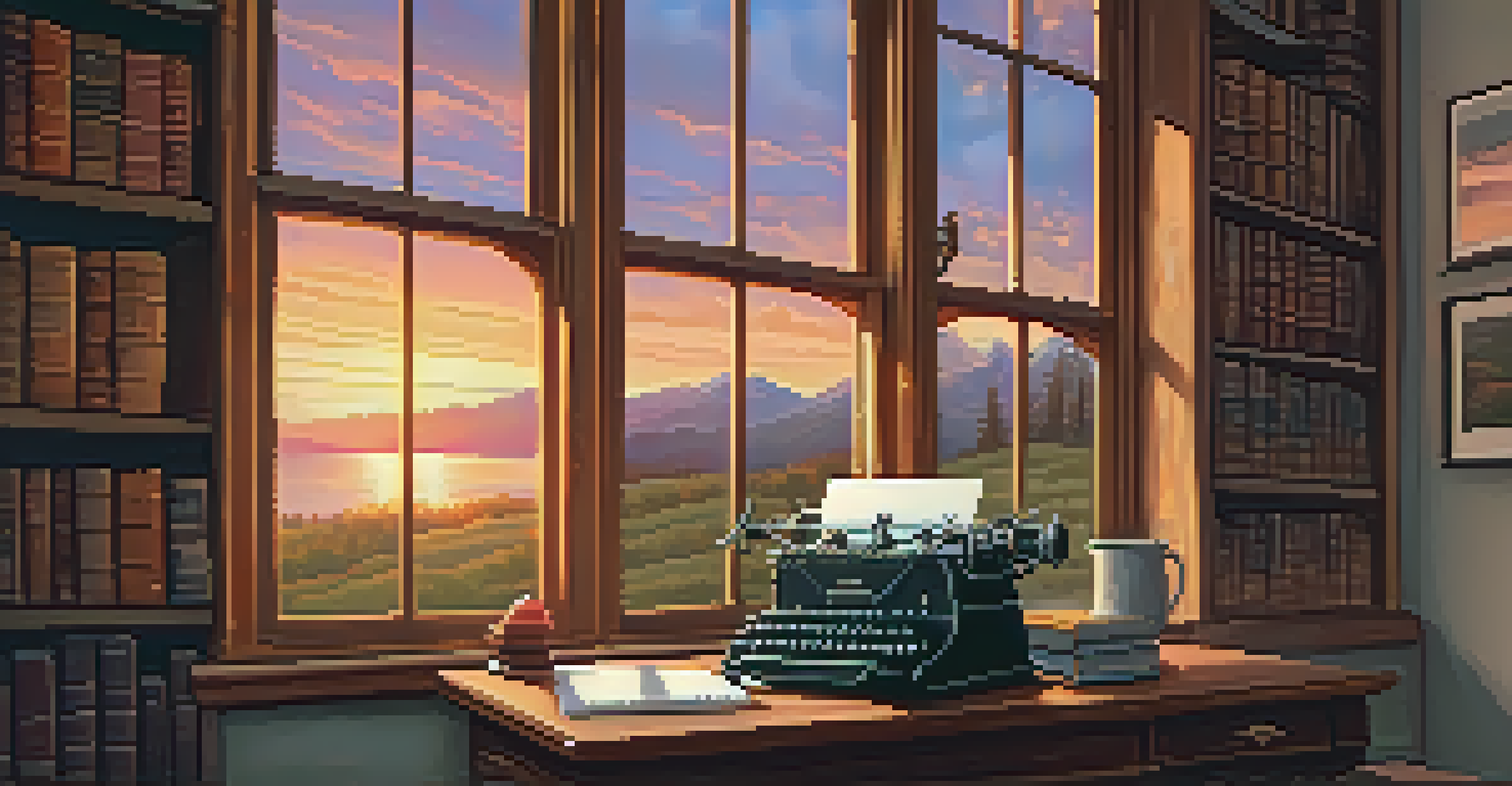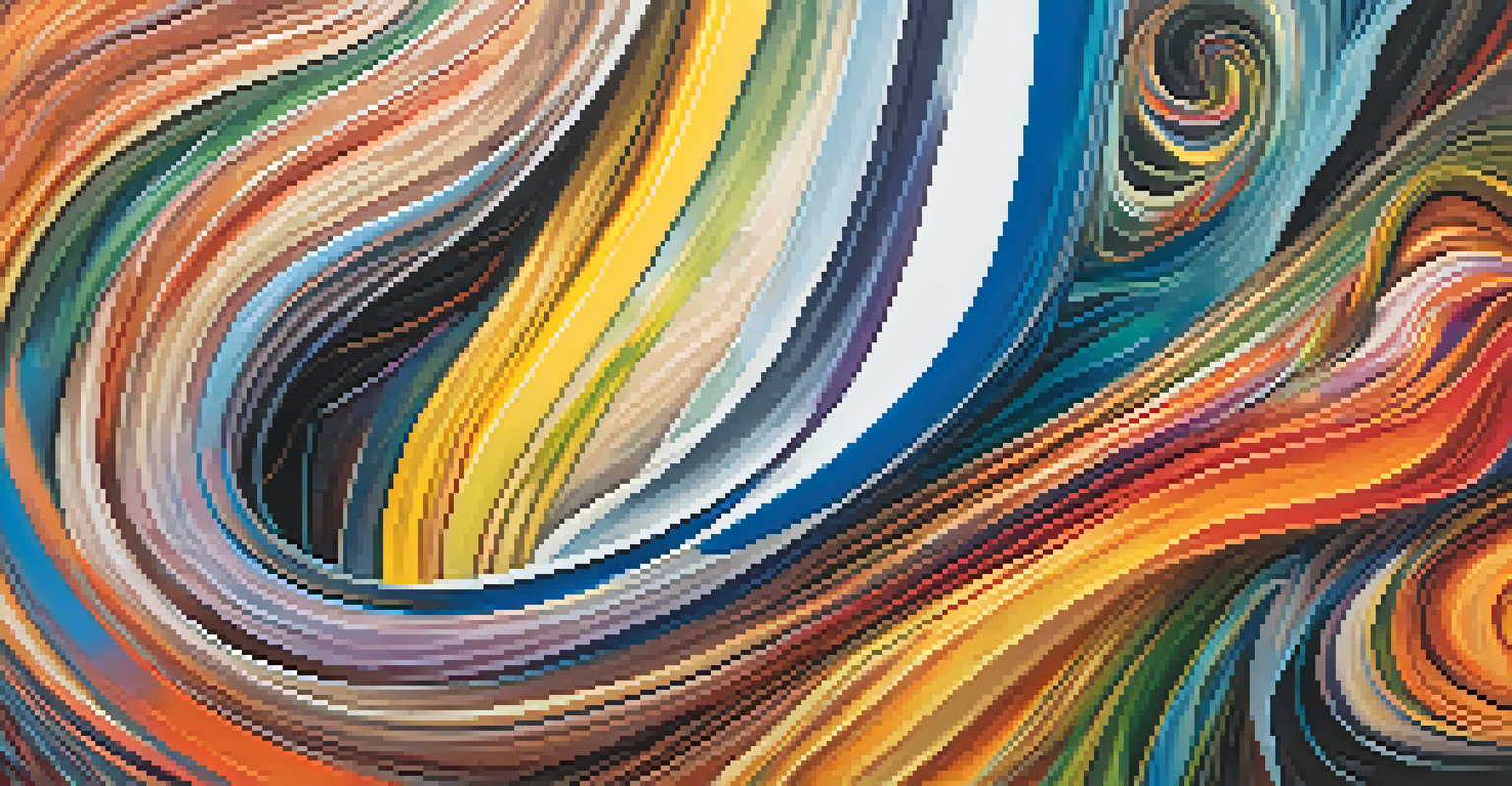The Role of Entheogens in Enhancing Creative Writing Skills

Understanding Entheogens and Their Purpose
Entheogens are substances that people use to induce altered states of consciousness, often for spiritual or creative purposes. Common examples include psilocybin mushrooms and ayahuasca, which have been used for centuries in various cultures. These substances can help individuals tap into their subconscious minds, making them a fascinating tool for creative exploration.
The creative process is a process of surrender, not control.
The term 'entheogen' itself is derived from Greek, meaning 'generating the divine within.' This concept highlights the belief that these substances can unlock deeper layers of creativity and insight. In the realm of writing, this can be particularly intriguing, as authors often seek new perspectives and ideas to enrich their stories.
While the use of entheogens is controversial, many writers have reported that they can enhance imaginative thinking and break through creative blocks. Their ability to shift perception may allow writers to access unique narratives and emotional depths that they might not have otherwise encountered.
The Connection Between Creativity and Altered States
Research suggests that altered states of consciousness can lead to heightened creativity. In these states, the brain's usual patterns of thought may be disrupted, allowing for novel connections and ideas to emerge. This is akin to a painter who steps back from their canvas to see the artwork from a fresh perspective, often leading to new inspiration.

For writers, this shift in thinking can break down barriers that limit their creativity. It’s similar to how a long walk can sometimes lead to a sudden burst of inspiration; stepping outside of one’s usual mindset can unlock a wealth of ideas. Many famous authors have embraced this exploration, using various methods to expand their creative horizons.
Entheogens Enhance Creativity
Entheogens can induce altered states of consciousness, helping writers access new ideas and break through creative blocks.
By understanding how these altered states influence creativity, writers can intentionally seek out experiences that foster innovation. Whether through meditation, dream journaling, or even the guided use of entheogens, the goal remains the same: to enhance the creative process and produce compelling narratives.
Historical Context of Entheogens in Creative Arts
Throughout history, many cultures have recognized the role of entheogens in enhancing creativity. For instance, the ancient Greeks used substances like kykeon during the Eleusinian Mysteries, believed to facilitate profound insights and artistic expression. Similarly, shamans in indigenous cultures have employed plant medicines to connect with the spirit world and inspire storytelling.
Creativity is intelligence having fun.
Famous writers such as Aldous Huxley and Jack Kerouac have openly discussed their experiences with psychedelics, attributing moments of inspiration to these journeys. Their works often reflect the deep, transformative experiences they encountered while exploring consciousness. This historical backdrop illustrates that the relationship between entheogens and creativity is not a modern phenomenon.
Understanding this historical context can motivate contemporary writers to explore their own creative boundaries. By recognizing that they are part of a long tradition of artists seeking inspiration through unconventional means, writers can feel more empowered to experiment with their own creative processes.
Potential Benefits of Using Entheogens for Writers
One of the key benefits of using entheogens is the potential to overcome writer’s block. Many writers find themselves stuck in a rut, struggling to find the right words or direction for their work. Entheogens may provide a fresh perspective, enabling them to see their writing from a new angle and spark innovative ideas.
Additionally, these substances can enhance emotional accessibility. Writers often strive to evoke strong emotions in their readers, and accessing one’s own emotional depths can lead to more authentic storytelling. By tapping into previously unexplored feelings, writers can create more relatable and impactful characters and narratives.
Historical Use in Creative Arts
Many cultures have historically utilized entheogens to foster creativity, with notable writers attributing their inspiration to these experiences.
Moreover, the communal aspect of using entheogens can foster collaboration and discussion among writers. Engaging in group experiences can lead to the sharing of ideas and perspectives, further enriching the creative process. This sense of community can also combat the isolation that many writers feel, providing support and encouragement.
Risks and Considerations When Using Entheogens
Despite their potential benefits, using entheogens comes with significant risks. Not everyone reacts positively to these substances, and they can sometimes lead to anxiety or overwhelming experiences. Writers must be aware of their own mental health and consider whether such an experience could be beneficial or detrimental.
Additionally, the legal status of many entheogens varies by location, which is an important consideration. Writers should always research local laws and ensure they are acting within legal boundaries. Engaging in responsible use is crucial for a safe and ethical approach to exploring creativity.
Lastly, it's essential to approach the use of entheogens with respect and intention. Rather than viewing them as a quick fix for creativity, writers should see them as tools that, when used thoughtfully, can enhance their creative journeys. Setting clear intentions and creating a supportive environment can help maximize the positive aspects of these experiences.
Integrating Insights from Entheogenic Experiences
Once writers have engaged with entheogens, the next step is to integrate their insights into their writing. This process can involve journaling about the experience, capturing the vivid imagery and emotions felt during the journey. By translating these insights onto the page, writers can infuse their work with authenticity and depth.
Additionally, writers might explore themes and ideas that emerged during their experiences. This could lead to the development of entirely new projects or the enhancement of existing works. Just as a photographer might sift through images to find the perfect shot, writers can sift through their insights to discover compelling narratives.
Risks and Responsible Use
While entheogens offer potential benefits for creativity, writers must approach their use with caution, considering mental health and legal implications.
Moreover, sharing these experiences with fellow writers can foster deeper connections and inspire collaborative projects. By discussing the impact of their journeys, writers can create a supportive network that nurtures creativity and encourages ongoing exploration.
Conclusion: Embracing Creativity Through Exploration
The exploration of entheogens in the context of creative writing invites a journey into the unknown. While these substances can offer unique insights and unlock new realms of creativity, it's essential to approach them with caution and respect. Writers should weigh the potential benefits against the risks and make informed decisions about their use.
Ultimately, the goal is to enhance one’s writing and storytelling abilities, making them more vibrant and impactful. Whether one chooses to explore entheogens or seeks alternative methods for inspiration, the key is to remain open to new experiences and perspectives. Creativity thrives when we step outside our comfort zones.

By embracing a mindset of exploration and curiosity, writers can cultivate a richer creative life. This journey can lead not only to personal growth but also to the creation of art that resonates deeply with others, enriching the world through the power of storytelling.